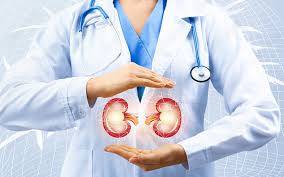Kidney disease affects millions of people worldwide, often silently progressing without noticeable symptoms until it reaches advanced stages. One of the most important factors in managing kidney disease, alongside medical treatment, is proper nutrition. Dietary adjustments can help preserve kidney function, reduce the burden on the kidneys, and manage complications like high blood pressure, anemia, or fluid imbalance. As kidney disease progresses through different stages, nutritional needs change. This article breaks down key nutritional considerations across all stages of kidney disease, from early signs to advanced conditions.
Stages of Kidney Disease
Chronic kidney disease (CKD) is
classified into five stages based on the kidney’s filtering capacity, known as
the glomerular filtration rate (GFR):
- Stage 1 and 2:
Early-stage kidney disease where GFR is between 60 and 89 mL/min. The
kidneys still function reasonably well, but there may be mild signs of
kidney damage.
- Stage 3:
Moderate CKD with GFR between 30 and 59 mL/min. Symptoms may become
noticeable, such as fatigue, swelling, and changes in urine output.
- Stage 4:
Severe kidney disease with a GFR of 15 to 29 mL/min, where kidney function
is significantly reduced, and dialysis or transplant may be required soon.
Stage 5: Kidney failure, or end-stage renal disease (ESRD), where GFR falls below 15 mL/min, requiring dialysis or a kidney transplant for survival.
Stage
1 and 2: Early Kidney Disease
In the early stages of CKD, the goal is to slow the progression of kidney damage while managing risk factors like high blood pressure and diabetes. Here’s what to focus on nutritionally:
Protein
Intake
- Moderate protein consumption: In early stages, it’s essential to avoid excessive
protein as it can strain the kidneys. However, very low protein is
unnecessary. Aim for balanced consumption from high-quality sources such
as lean meats, poultry, eggs, and plant-based proteins like beans or
lentils.
Sodium
Reduction
- Limiting salt intake:
High sodium can increase blood pressure, worsening kidney damage. Limit
daily intake to less than 2,300 mg by avoiding processed foods, fast
foods, and adding less salt during cooking.
Fluid
Management
- Staying hydrated: Proper hydration supports kidney function. However, consult a healthcare provider if you experience swelling or have heart problems, as fluid restriction may be necessary.
Balanced Diet
Eating whole foods: Prioritize fresh fruits, vegetables, whole grains, and healthy fats to maintain overall health. Control blood sugar if diabetes is present.- Stage 3: Moderate Kidney Disease
- As kidney function declines in stage 3, further adjustments are needed to manage waste buildup in the blood and potential symptoms.
-
Protein
Further reduction in protein intake: At this stage, moderate protein restriction becomes more important to limit the production of waste products like urea. Consulting with a dietitian is recommended to balance protein needs without overburdening the kidneys.
Phosphorus and Potassium
- Phosphorus control:
The kidneys are less able to filter phosphorus, leading to high levels
that can weaken bones and damage blood vessels. Avoid high-phosphorus
foods such as dairy, cola drinks, organ meats, and packaged baked goods.
- Potassium monitoring:
Depending on lab results, potassium levels may need to be managed. Avoid
high-potassium foods like bananas, oranges, and potatoes if levels are
elevated.
Sodium and Fluid
- Continued sodium reduction: Keep sodium intake low to manage blood pressure and
fluid retention.
- Fluid management: Depending on symptoms such as swelling, fluid intake may need to be regulated to prevent overloading the kidneys
- .Stage
4: Severe Kidney Disease
Stage 4 CKD requires more careful nutritional planning as the kidneys have very limited ability to filter waste, and symptoms become more pronounced.
Protein
- Further protein restriction: A low-protein diet becomes critical, but it must be
balanced with ensuring adequate nutrition. This stage often requires
working closely with a renal dietitian to design a personalized eating
plan.
Phosphorus and Potassium
- Phosphorus and potassium control: More strict management is needed, as imbalances can
lead to dangerous health conditions like heart problems or bone disease.
Phosphate binders may be prescribed, and potassium levels should be
carefully monitored to prevent hyperkalemia (high potassium levels).
Calcium and Vitamin D
- Bone health management: As phosphorus builds up, calcium levels drop, leading to weak bones. Vitamin D supplements may be necessary to maintain bone health, but calcium supplements should be used cautiously to avoid increasing calcium deposits in the heart or blood vessels.
Stage 5: End-Stage Renal Disease (ESRD)
In stage 5, kidney function is nearly gone, and dialysis or a transplant is usually required to sustain life. Nutrition plays a significant role in managing symptoms and improving quality of life for dialysis patients.
Protein for Dialysis Patients
- Increased protein needs: Dialysis removes protein waste but also results in
protein loss, so patients on dialysis need higher protein intake than
earlier stages to maintain muscle mass and overall health. Choose
high-quality protein sources such as eggs, fish, and lean meats.
Fluid and Electrolytes
- Fluid restrictions:
For those on dialysis, fluid intake is often strictly limited to prevent
fluid overload. Foods high in water content, such as soups and fruits,
should also be limited.
- Electrolyte management: Phosphorus and potassium control remains essential.
Dialysis patients may need specific phosphate binders and
potassium-reducing medications to manage levels.
Caloric Needs
- Sufficient calories: Patients on dialysis often require more calories to prevent malnutrition. Healthy fats like olive oil, avocados, and nuts can be beneficial to maintain weight without overloading the kidneys.
-
The Importance of a Renal Dietitian
For individuals at any stage of kidney disease, working with a renal dietitian is critical. These professionals are trained to create tailored nutrition plans that address your unique needs, ensuring that you maintain good health while protecting kidney function. Dietary modifications can greatly impact your quality of life, helping to manage symptoms, reduce complications, and slow the progression of kidney disease.By understanding how nutrition impacts kidney disease and making the necessary dietary changes, you can take an active role in your kidney health, supporting your body at every stage of the journey.
- Increased protein needs: Dialysis removes protein waste but also results in
protein loss, so patients on dialysis need higher protein intake than
earlier stages to maintain muscle mass and overall health. Choose
high-quality protein sources such as eggs, fish, and lean meats.
- Further protein restriction: A low-protein diet becomes critical, but it must be
balanced with ensuring adequate nutrition. This stage often requires
working closely with a renal dietitian to design a personalized eating
plan.
- Phosphorus control:
The kidneys are less able to filter phosphorus, leading to high levels
that can weaken bones and damage blood vessels. Avoid high-phosphorus
foods such as dairy, cola drinks, organ meats, and packaged baked goods.




No comments yet
Be the first to share your thoughts!